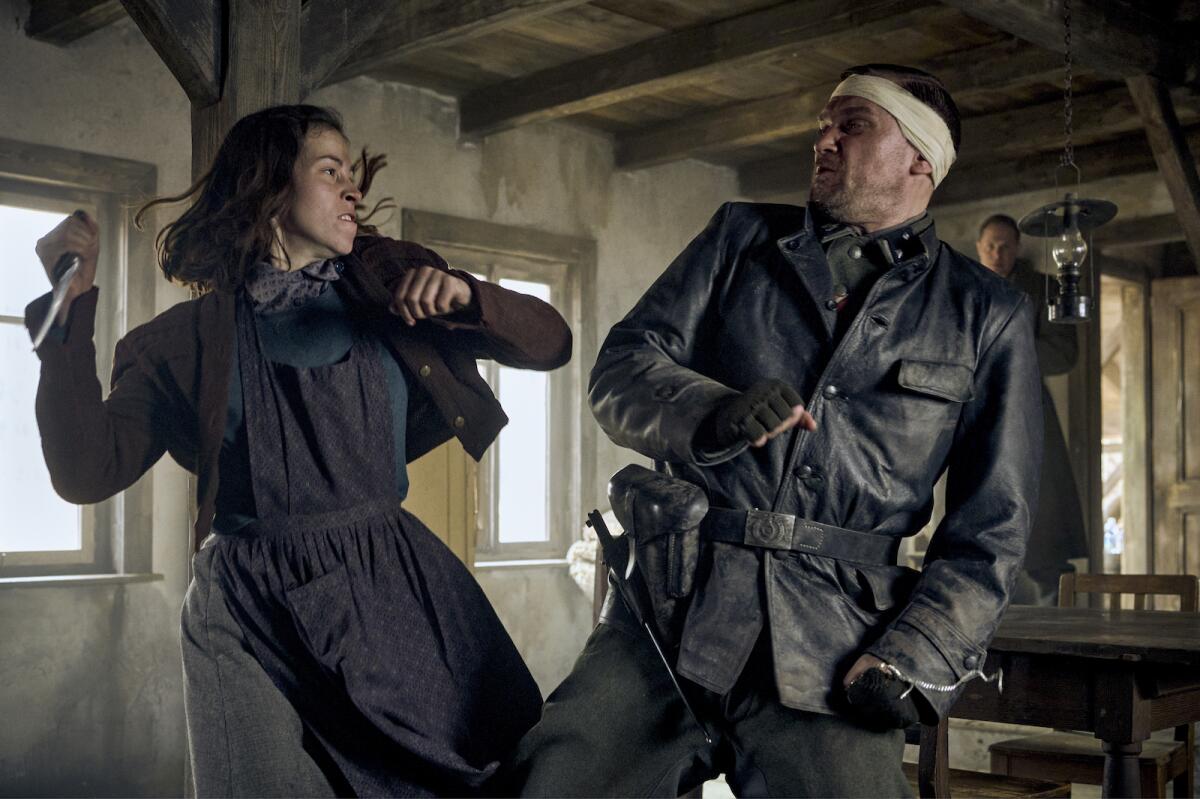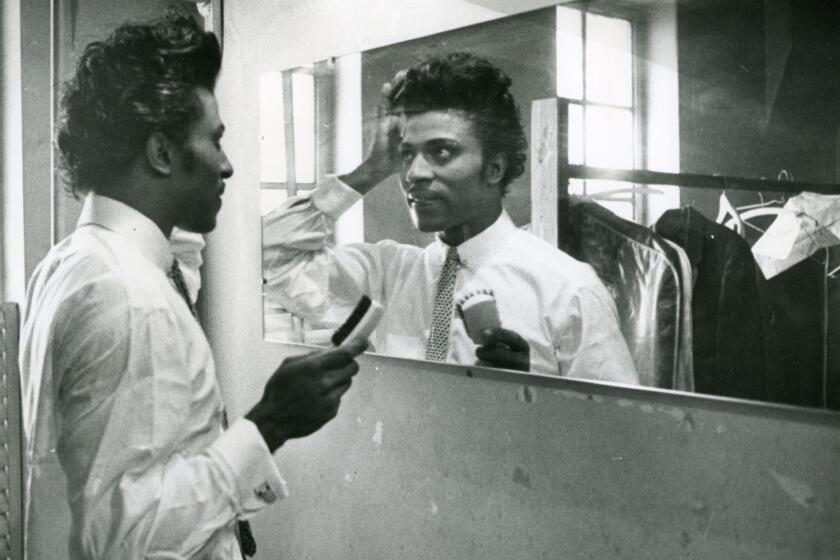Pulpy, revisionist World War II thriller ‘Blood & Gold’ focuses on survival not war

- Share via
‘Blood & Gold’
Though it’s set in the waning days of World War II, the pulpy thriller “Blood & Gold” isn’t really a war movie. Director Peter Thorwath and screenwriter Stefan Barth are aiming for something more like the revisionist westerns of the 1960s and ‘70s, telling a story about a bunch of desperate opportunists grabbing whatever they can in a lawless zone. Robert Maaser plays Heinrich, a disillusioned German army deserter who gets rescued from a lynch mob by a farmer, Elsa (Marie Hacke). To pay Elsa back, Heinrich helps her exact some vengeance on the ruthless SS officers who have been terrorizing her community in a search for hidden Jewish treasure.
Barth’s story is enjoyably twisty, filled with surprises about all the mischief that Elsa’s neighbors have been up to during the war; and Thorwath’s direction is dynamic without going too far over the top. There are clear heroes and villains here, which means there are some characters that are easy to cheer for and some that are easy to hiss. The film as a whole is suffused with a believable world-weariness, carried by people who have endured years of violence and brutality and who no longer have any compunction about ditching morality for the sake of survival.
‘Blood & Gold.’ In German with subtitles (or dubbed). TV-MA, for language, sexual violence, smoking and violence. 1 hour, 38 minutes. Available on Netflix
‘The American Gladiators Documentary’
The latest installment in ESPN’s long-running “30 for 30” series is a two-part, nearly three-hour look back at the “American Gladiators” franchise, directed by Benjamin Berman — a veteran of TV sketch comedy and the creator of the reality-bending feature film “The Amazing Johnathan Documentary.” Like that movie, “The American Gladiators Documentary” is partly about myth-building, partly about myth-debunking and partly about how hard it can be to get people to tell the truth when there’s a lot of money at stake. In the case of “American Gladiators,” Berman finds himself at odds throughout the film with Johnny Ferraro, the show’s co-creator, who fights to preserve its reputation from the mass of disgruntled former employees and anyone who might have a claim to some of the “Gladiators” revenue.
The storytelling in “The American Gladiators Documentary” suffers some from a structure that feels unduly extended and bifurcated. Part 1 is mostly about the original “American Gladiators” phenomenon, when a cheesy-looking show about amateur athletes and professional bodybuilders competing in cartoonish combat games became one of the most successful syndicated TV series ever — all while the stars were underpaid, in pain, and constantly being made aware that the producers considered them replaceable. Part 2 explores a mystery raised in the first part: Why doesn’t Ferraro want Berman to talk to the show’s other co-creator, Dan Carr? This second part — which includes dramatic re-creations of Carr’s unpublished memoir — is so much more engaging than Part 1 that it’s a shame viewers have to wait nearly 90 minutes to see it.
Despite its flaws, threaded throughout this ungainly film is a dramatic and at times moving tale about people trying very hard not to be the villains in anyone’s hero narrative. Ferraro doesn’t want to be seen as a bad guy. The former Gladiators who felt exploited by the show don’t want to be seen as chumps. It took a lot of hard work and hurt feelings — and hurt bodies — to build this brand. “The American Gladiators Documentary” reveals what it has taken to protect it.
‘The American Gladiators Documentary.’ TV-MA, for language and violence. 2 hours, 48 minutes. Available on ESPN+
‘Little Richard: King and Queen of Rock ‘n’ Roll’
Earlier this year, Lisa Cortes’ documentary “Little Richard: I Am Everything” drew a lot of attention on the festival circuit and in limited release, and was praised for its comprehensive portrait of an innovative, genre- and gender-bending musician. James House’s “Little Richard: King and Queen of Rock ‘n’ Roll” (airing as part of PBS’ “American Masters” series) isn’t quite as good as “I Am Everything,” primarily because House has fewer interview subjects and a smaller pool of archival footage. But for those who haven’t seen “I Am Everything” — and perhaps even for those who have — there’s still a lot to learn here about the particular ways that Little Richard fused gospel ecstasy, roadhouse sweat and subversive bawdiness into his own musical form, inspiring everyone from the Beatles and the Rolling Stones to James Brown and Prince. House covers this story well, celebrating a genius who transformed American popular music.
‘Little Richard: The King and Queen of Rock and Roll.’ Not rated. 1 hour, 34 minutes. Available June 2 on PBS
Lisa Cortes’ energetic documentary gives the influential rock pioneer his trailblazing due as it grapples with the demons that vexed him.
Available now on DVD and Blu-ray
“Thelma & Louise” drew a big audience and started a lot of conversations back in the summer of 1991, thanks to Callie Khouri’s Oscar-winning screenplay, Ridley Scott’s energetic direction, and the performances of Susan Sarandon and Geena Davis as two best friends who become fugitives after a righteous act of vengeance. The new Criterion Blu-ray adds deleted scenes, multiple commentary tracks, and vintage behind-the-scenes featurettes. The Criterion Collection
More to Read
Only good movies
Get the Indie Focus newsletter, Mark Olsen's weekly guide to the world of cinema.
You may occasionally receive promotional content from the Los Angeles Times.











